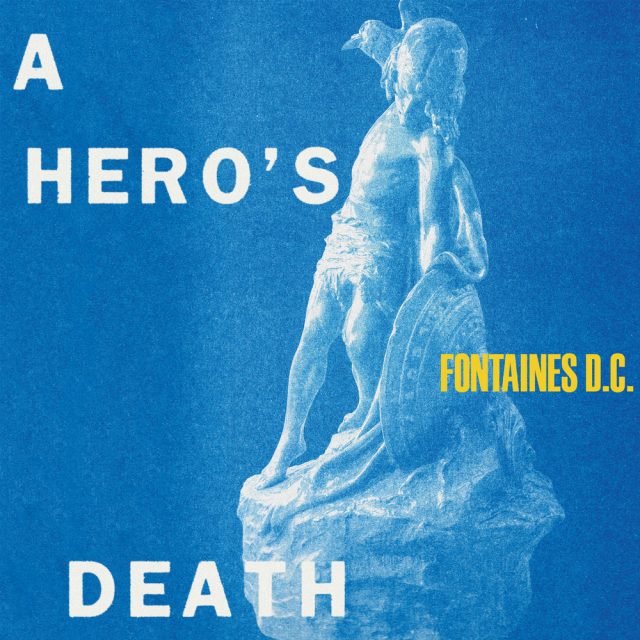Like a number of great albums, Fontaines D.C.‘s A Hero’s Death begins with a thesis and ends with an emotional credence. The brooding incantation on the opening track ‘I Don’t Belong’ is as familiar to the post-punk genre as any: “I don’t belong to anyone,” frontman Grian Chatten proclaims again and again over a slow-burning instrumental. What starts as a mere observation quickly turns into a statement of intent: “I don’t wanna belong to anyone.” There are obvious parallels to the band’s own meteoric rise to success following the release of their 2019 debut, Drogel; the line belies a refusal for their art to be commodified, yes, but also a sense of alienation springing from the Dublin quintet’s world tour and the exhaustion that came with it. “We weren’t really eating and we were burning the candle at both ends,” Chatten recently told NME. “It became a bit surreal as towns melted into each other and faces started to look a bit strange.”
Listening to A Hero’s Death, you get a taste of that phantasmagoric experience; not so much in the album’s content as its overall atmosphere, which seeds with a sense of estrangement, disorientation, and unease. Throughout the album, Fontaines D.C. negotiate their place in the world, eschewing any fixed perceptions of who they’re supposed to be but doing so with enough subtlety to render it compelling. “I was not born/ Into this world/ To do another man’s bidding,” Chatten declares on ‘I Was Not Born’; Conor Curley and Carlos O’Connell’s propulsive, anthemic guitars sound like the the rest of the world running after him as he manically cries out “You won’t catch me/ No, you won’t catch me.”
You can’t always tell what Chatten is singing about, and that’s part of what makes A Hero’s Death so enthralling. He fixates on a certain phrase until it’s stripped of all associations: there’s a clear hint of irony to ‘Love is the Main Thing’, whose central mantra morphs into something dark and sullen, Chatten’s delivery growing from weary to chaotic as a nightmarish guitar line looms over and Tom Coll’s drumming coils around him like a snake, ready to devour him at any minute. On the vitriolic ‘Televised Mind’, he repeats the line “That’s a televised mind” as the band boasts one of their most hypnotically electrifying performances. The idea of corporatising your artistic ideals reemerges: “Swipe your thoughts from Broadway/ Turn ideals to cabaret/ Water dreams of yesterday/ Fall behind,” Chatten sings. His commentary is sharp, but never too obvious.
If the plan was to lead the band back into obscurity by presenting a less accessible sound, this obviously hasn’t worked – A Hero’s Death catapulted to the top of the U.K. charts, second only to Taylor Swift’s folklore. If, on the other hand, the goal was to create something a bit more fragmented and less direct than its predecessor, Fontaines D.C. have more than delivered on their promise. The album is downcast and atmospheric without sacrificing the band’s energy, but it’s also filled with some of their most memorable hooks, which get lodged into your mind less like a catchy pop song than a nightmare you can’t quite shake. ‘Living in America’ is moody and evocative, Chatten’s voice reaching its lowest register, but it’s also surprisingly melodic. The title track cleverly offsets a rock n’ roll-inspired rhythm and the faux-inspirational “life ain’t always empty” with a simmering sense of dread conjured by the ghostly vocal harmonies and a rollicking instrumental that slowly edges towards oblivion.
The outro is the only instance where Chatten directly references the band, and it’s a blink-it-and-you’ll miss it moment: “That was the year of the sneer now the real thing’s here,” he mutters. The real thing, it turns out, is complicated. But ultimately, the album is less about reflecting on the band’s own trajectory than about navigating the line between sincerity and cynicism: the central question of metamodernism. Whenever they dip their toes into something resembling optimism, like on the dreamy ballad ‘Oh, Such a Spring’, it’s always covered in layers of sarcasm. But the closing track marks a kind of turning point: the band seem to do away with the disaffected ethos that has long characterized the genre, as Chatten bellows: “Even though you don’t know/ Even though you don’t/ You feel.” He then offers the perfect advice, not just for appreciating A Hero’s Death, but, surprisingly, life as a whole: “And please don’t lock yourself away/ Just appreciate the gray.”
